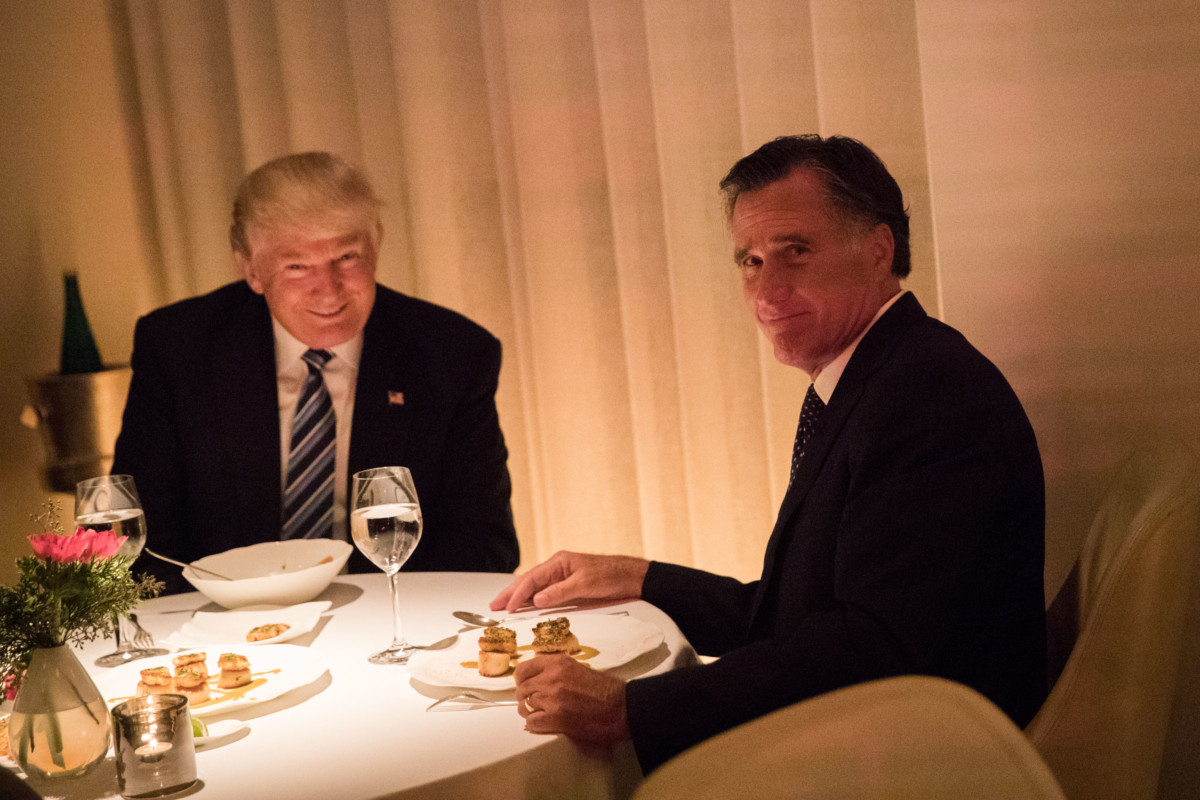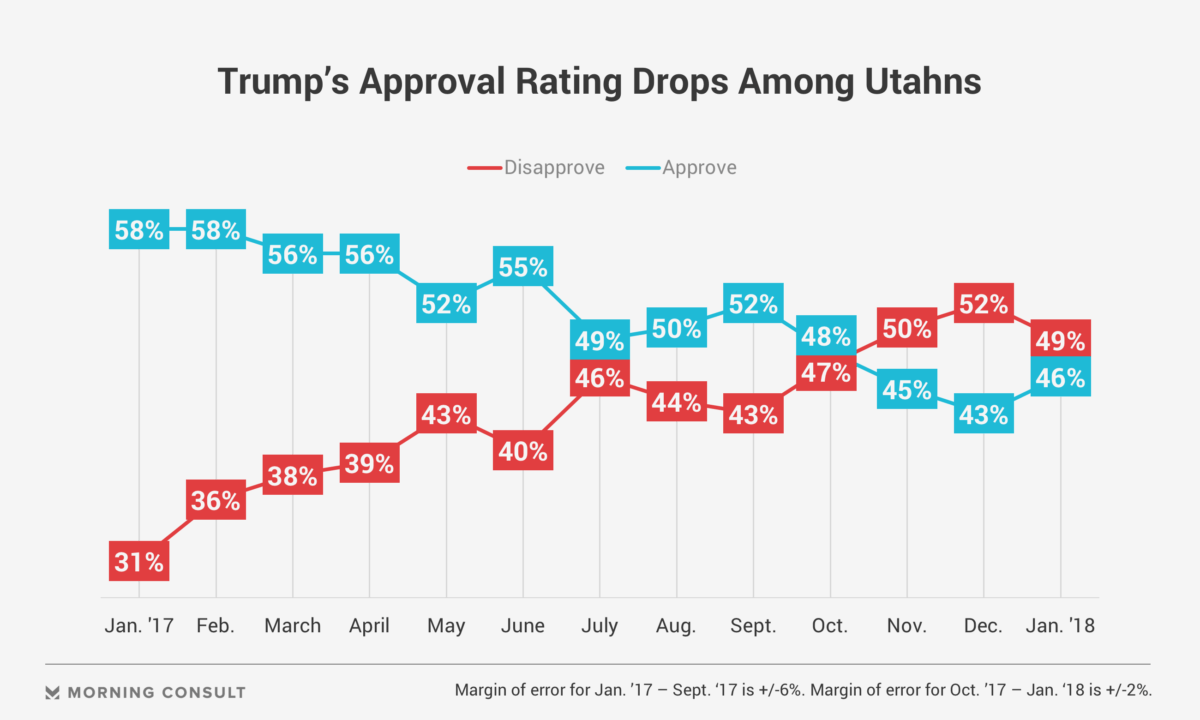Polling Puts Romney on Solid Ground to Continue Trump Rebukes

Key Takeaways
Trump suffered a 30-point drop in his net approval rating among Utahns between January 2017 and January 2018.
It's the biggest drop among any of the solidly Republican states in the country.
Mitt Romney is the overwhelming favorite to win this year's race to replace retiring Sen. Orrin Hatch after his expected candidacy announcement, which is expected soon. Less clear is the type of posture Romney would take with President Donald Trump on the campaign trail -- and if he makes it to Washington as a freshman Republican senator from Utah.
Romney had been expected to make his political intentions known on Thursday, but on Wednesday he postponed the announcement "out of respect for the victims and their families" following the Parkland, Fla., high school shooting earlier in the day that claimed at least 17 lives.
Whenever the 2012 Republican presidential nominee and former Massachusetts governor launches his Utah campaign, Morning Consult polling suggests he'll be on safe political ground if he wants to be the Senate GOP’s top Trump critic. Net approval for Trump in Utah has eroded by 30 percentage points -- more than in any other solidly Republican state -- since his inauguration.

In the January 2017 survey, which had a margin of error of plus or minus 6 percentage points, 58 percent of registered voters in Utah approved of him and 31 percent did not. One year later, the share of support had fallen to 46 percent, while 49 percent disapproved of his job performance. Last month's survey had a margin of error of plus or minus 2 percentage points -- see methodology here.
Utahns' relative coolness to the president isn't exactly new: He won less than 46 percent of the vote in 2016, compared with Romney's nearly 73 percent in 2012.
Experts say the state's strong Mormon bent is a significant factor. Fifty-eight percent of Utahns are LDS members, and 7 out of 10 Mormon adults in the United States self-identify as Republican, according to a 2014 Pew Research Center study. Matthew Bowman, a history professor at Arkansas' Henderson State University and author of "The Mormon People: The Making of an American Faith," said Mormons' aversion to Trump is largely based on his perceived moral failings as well as his brash personality.
"Mormons have embraced the notion of respectability," Bowman said in a phone interview on Tuesday. "Trump has not."
The White House did not respond to a request for comment.
It's no surprise then that Trump's loudest Senate GOP critic has been Jeff Flake of Arizona, a Mormon who decided not to run for re-election amid primary challengers in Arizona and has since spoken more freely about what he calls the president's undemocratic tendencies without fear of angering his Republican base. Flake's numbers among Arizona Republicans have tanked as he's lobbed those criticisms, Morning Consult surveys show.
In a brief Tuesday interview at the Capitol, Flake -- who said he met with Romney two weeks ago -- seemed energized about the prospect of the former Massachusetts governor taking up the mantle of defending the values of conservatism and protecting the party's image going forward.
"Where we're headed is not good," he said. "Young people who have been walking away from the party are at a gallop right now."
Trump and Romney have a somewhat tangled history. After accepting Trump's endorsement in his 2012 presidential race, Romney became a vocal critic four years later. However, after Trump beat Democratic nominee Hillary Clinton in November 2016, Romney expressed interest in being tapped to lead the State Department -- a post that ultimately went to Rex Tillerson.
Romney has since been critical of several statements or sentiments expressed publicly or privately by the president, including when Trump equivocated over who was to blame for the fatal violence in Charlottesville, Va., and more recently when he reportedly denigrated African nations and Haiti.
While public polling shows Romney is immensely popular in the state, according to UtahPolicy.com, he has at least one high-profile Republican detractor: Rob Anderson, the state's Republican Party chairman. In a Wednesday phone interview, Anderson expressed frustration that Romney had yet to reach out to him about his plans for the Senate run and likened him to former Sen. Hillary Clinton (D-N.Y.), criticizing him for running for office in a state in which he does not primarily reside. Similar comments were first reported by The Salt Lake Tribune.
Anderson also said Romney has not supported Trump adequately, and called for a Republican primary challenge.
"All I can say is, for months I've been contacted by people who want someone that can represent Utah better than Gov. Romney," he said, noting that he was set to share a table with the former presidential candidate at a fundraiser for the Utah County GOP Friday night.
A Romney spokesperson did not immediately respond to a request for comment.
I urged him to run because I think he is a once-in-a-generation public servant, and I have no doubt he’ll represent our state and interests well.
It's unclear how widespread Anderson's sentiments are in the party, but retiring Sen. Orrin Hatch (R-Utah) was quick to back Romney in a statement Wednesday.
“I like Rob quite a bit, but I have to strongly disagree with him here," Hatch said. "Mitt has been a household name in Utah for decades, his family history goes back to Mormon pioneers, and he’s done a lot for our state.
"I urged him to run because I think he is a once-in-a-generation public servant, and I have no doubt he’ll represent our state and interests well.”
This story has been updated to note the postponement of Romney's expected announcement.
Cameron Easley is Morning Consult’s head of political and economic analysis. He has led Morning Consult's coverage of politics and elections since 2016, and his work has appeared in The New York Times, The Wall Street Journal, The Washington Post, Politico, Axios, FiveThirtyEight and on Fox News, CNN and MSNBC. Cameron joined Morning Consult from Roll Call, where he was managing editor. He graduated from the University of North Carolina at Chapel Hill. Follow him on Twitter @cameron_easley. Interested in connecting with Cameron to discuss his analysis or for a media engagement or speaking opportunity? Email [email protected].